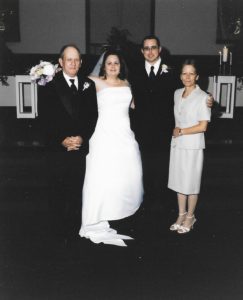Sensitive material: The following piece contains details of suicide. The author shares this account to help bring awareness to suicide and its victims, including those who are left behind. Although the details are difficult to read, it is important to talk about this and mental illness. Please be advised before reading.
If you or someone you know is in need of help, please consult the resources listed at the end of this account.
It started at the train tracks.

This was before all railroad tracks had the guard arms in front of them. The car in front of her u-turned to find a way around the train. She pulled forward, forgetting to put the car in park and distracted by a handmade nativity she had just picked up in the seat beside her. She took her foot off the brake and rolled forward, the train rushing by. It ripped at her bumper.
Making a stop to calm herself, she assured the man who offered to call someone to come get her that she was fine. She convinced the man that the car was still driveable, that she was okay to go home on her own, and she just wanted to put up her nativity and call her husband.
She took the entire contents of a prescription bottle she had just picked up.
She wrote a letter, put her nativity in place, and called her husband. They fought about her being careless with the car. She yelled at him, “I’ll finish what the train didn’t do!” She hung up the phone, refusing to answer the constant rings as her husband tried calling back from his job in the next town over. He rushed home to stop her but was too late. The gun that she had convinced him to bring in the house because they lived in the country was found down the path, still in her hand in the garden where she fell.
Her letter said she was tired of hurting and being sick all of the time. She was 46 when she said no more. The train had been the last straw for her fragile mind, and she snapped.
Later, a grieving young woman picked up her fourth-grade daughter early from school.
She delivered the news that the woman who was the sun in her daughter’s world was no more. The girl cried but refused to believe this. When they arrived at the house, she tried to run down to where it had happened, but a busy body woman from church stopped her. “Let go of me. You’re not my parent. You have no right.” She hesitated though and didn’t go down the garden path to see for herself.
At nearly midnight when all the well-meaning people had come and gone, she lay in her bed against the wall and kicked until it hurt enough that she could cry. She was her Nanny’s Heart; Nanny had said so. The letter had said, “Take care of My Heart.” But didn’t she know she was the one to do that best?
The girl refused to leave her grandfather’s house. She had never seen him cry before, and she was terrified that if she wasn’t with him that he would leave her, too. Then she would be all alone. It took about two weeks for her Mama to convince her to come home, and even then the girl went back every weekend. She knew he wouldn’t do it if she were there.
Weeks after it had happened, she was finally brave enough to sneak down the garden path to see for herself.
She needed something. There had to be some proof that Nanny was not really gone. It had been a closed casket. She held to childish hopes that the grownups had lied, even if she hadn’t worked out a story as to why they would have or where Nanny would have gone. She clung to that hope. But the ground was bare, dry and hardened by winter. It held her proof, as it was still stained with blood.
She knew that her Nanny was gone and she was left behind.
The garden path was left to grow over and never used again for their summer garden. Nightmares came for years afterward. Sometimes Nanny was a ghost who she feared, and sometimes she had been living somewhere else forced by circumstances beyond her control to leave the girl behind.

Eventually, things grew worse with her stepfather, and she permanently moved in with her grandfather. He lived to see her graduate, to give her away at her wedding, and to meet her first child before he died. Her Mama had died four months before him. The girl, now a woman, felt abandoned again.
Over thirty-one years later, and it still leaves a mark.
I am not sure if a person fully understands the impact of their decisions on those they leave behind. I’ve never learned to shoot a gun and as an adult, I refuse to have one in our home. I’ve always thought that I could never commit suicide and do that to my loved ones. I am against suicide as an option to solve your problems.
But in my darkest hours, I understand how Nanny reached that point. I wonder if something in me could snap. I fear that being bipolar, I might not always have complete control and could do something under normal circumstances I am against.
The constant body pains. The mind spinning nonstop at night so that sleep remains elusive. The abandonment issues that lead to those are you good enough fears and childhood traumas. I wonder if she felt the same.
I’m not entirely sure what laid this on my heart to tell everyone. Maybe because in this world you can never truly know what goes on in someone’s mind. You never know all the demons that someone is living with. To you, it might be insignificant; to someone else, it could be what tips the scales from manageable to their world falling apart. Think of those like Robin Williams and Kate Spade who shocked the world by ending their lives. No one would have guessed their inner struggles by their outer demeanor.
If you are struggling, please ask for help. You are never alone.
If you think someone may be suicidal, please talk with them and get them help.
ALWAYS be kind. Your smile, your thoughtful words, and your friendship could make a simple difference to give hope. You never know the sorrows of someone else’s mind.
In memory of Brenda B. Ashley
You made the world a better place for me.
Are you looking for help now?
Tricare Mental Health Information
National Network of Depression Centers
Mental Health America Affiliate Resource Center
National Suicide Prevention Lifeline – 1-800-273-8255
(If you are in an immediate crisis, go to your local emergency room)












Oh your honesty leaves me breathless. I’ve had several friends and loved ones lose a child to suicide. Just heartbreaking. Thank you so much for sharing your story. It’s so important to keep this topic open. ❤️
Dani, thank you for sharing your experience. It gives people a glimpse of the tremendous feeling of loss. One point I want to make is a suicidal person is not in their logical mind. They cannot think beyond the feeling of despair. I pray you recognize your Nanny didn’t choose herself over you. Her mental illness destroyed her life.
At the time it happened I was only ten so I obviously didn’t understand everything and wasn’t given all of the details until I was older. Although sometimes adults don’t always pay attention to little ears listening to everything and I probably picked up way more about the whole thing than they meant for me to at the time. I definitely went through stages of understanding with her loss.
Comments are closed.